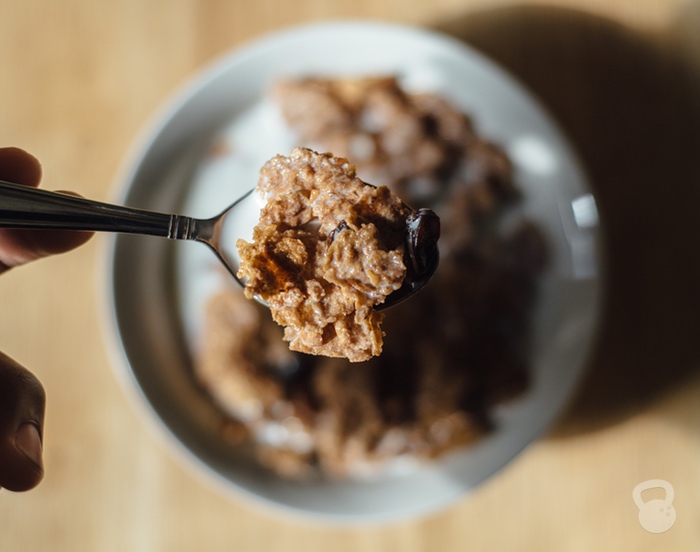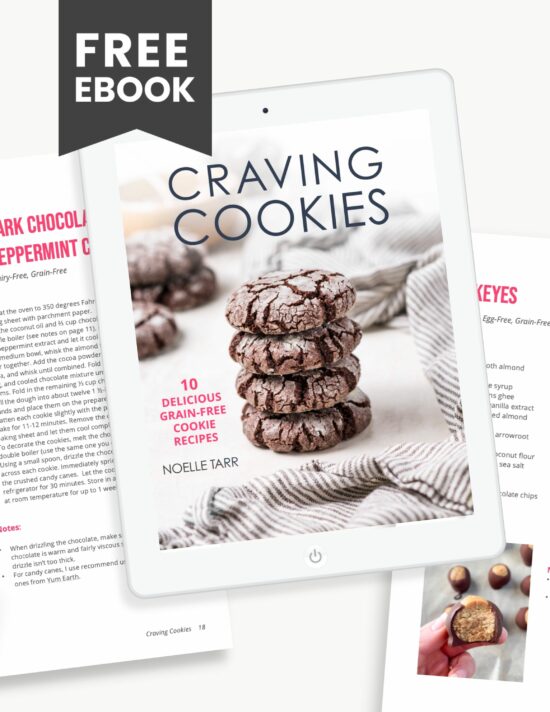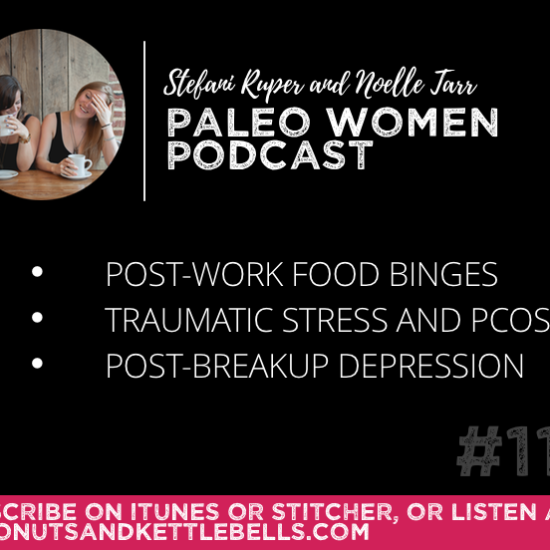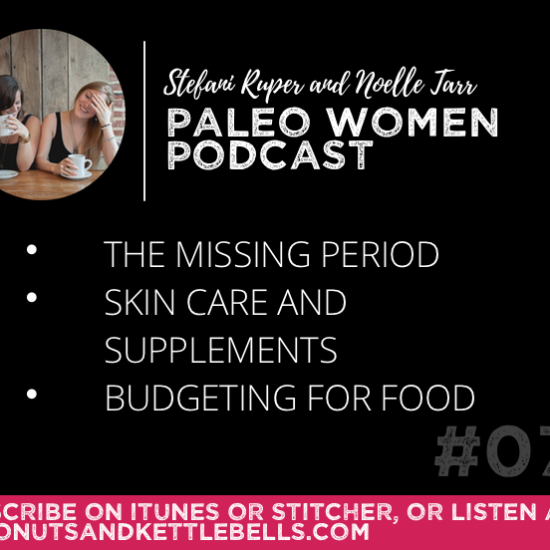This post may contain affiliate links. Please read our disclosure policy.

While there are many pervasive rules that exist in the world of health and fitness, one of the most common ones people often believe is eating at night is bad for you.
And truth be told, many of us find comfort in these black and white directives. We like giving adjectives like “good” or “bad” to certain behaviors or foods because it makes it easier, and gives us a false sense of control. These catchy secrets are also what sells, which is why many self-proclaimed “experts” in health and fitness continue to perpetuate certain myths.
Like you need to eat 1,200 calories a day to lose weight. And toning.
But, will not eating at night make you healthier? And is there any validity behind the idea that eating at night is bad?
The answer may actually surprise you.
Jump to:
Eating at Night: What the Research Says
You may expect that the advice you hear from books, magazines, or given online by health and fitness enthusiast is valid, and has at least some scientific backing.
Unfortunately, that’s not the case.
In fact, when it comes to eating at night, there are no studies that show eating at night facilitates any additional accumulation of adipose tissue when compared to eating the exact same food at an earlier time period.
Preliminary research suggests that we can eat at a variety of times without health consequences, depending on our energy requirements and lifestyle. And while there is so much more to be discovered, some research suggests eating the majority of carbohydrates at night might improve satiety and lead to weight loss, and eating protein just before bed increases muscle protein synthesis and improves whole-body protein balance.[1][2][3]
Point blank: Your body will not store extra adipose tissue after eating a specific meal at 9:00pm as opposed to 5:00pm. If you don’t get off work until late, or you become hungry after dinner due to not eating enough, you should eat nourishing foods and fuel your body.
Eating at Night: Debunking the Myths
Health and fitness enthusiasts recommend avoiding eating at night for a few reasons.
First, because people typically relax and recharge in front of the TV or other electronics at night, eating at night can be mindless. Feelings of loneliness or sadness also tend to impact people at night, and food can be used to provide comfort. This does not mean eating food at night or while watching your favorite movie is inherently bad, it simply means it’s best to always remain mindful of food choices and why you are choosing to eat.
Second, many people tend to eat at night because they restrict calories or a specific macronutrient during the day out of fear. This can result in overeating, eating quickly, and eating things that we perceive are “bad” or not good for us when we’re tired and low on motivation.
Put simply, the main reason why people binge or overeat is because of physical restriction (not giving your body enough calories), and/or emotional restriction (not allowing yourself to enjoy a food emotionally because of feelings of shame). I recommend following the principles of intuitive eating for further insight.
And lastly, conventional “broscience” says that because our metabolism slows as we fall asleep and we experience decreased insulin sensitivity at night, we are more likely to gain extra fat if we give our body energy during this time period.
But, nope.
Scientists have found that our sleeping metabolic rate (SMR) falls and rises throughout the night. These variations actually make our SMR equivalent to our resting metabolic rate (RMR) during the day.[4][5][6]
As for insulin, research does show that levels of blood glucose and insulin remain elevated longer with evening meals in comparison to morning meals.[7] This is because when we wake up, we have a heightened insulin sensitivity, which is most likely due to the fasting that occurs during sleep. However, when comparing midday meals to evening meals, there is no difference in insulin sensitivity or glucose tolerance.
In short, insulin isn’t necessarily impaired at night, it’s simply enhanced in the morning.
Is Eating at Night Right for YOU?
Taking into account the information above, it’s safe to assume that for the majority of the population and within the context of each person’s bioindividuality, health isn’t about when we eat – it’s about what we eat, and our mindfulness throughout the process.
So, are there times that eating at night may or may not be the best idea? Absolutely.
For some people, eating at night just prior to bed may cause sleep disturbances. This might be due to a number of factors, including impaired digestion or gastroesophageal reflux disease (GERD.)[8] If you have a hard time falling asleep, or are currently suffering from upper GI issues like GERD, it may be a good idea to limit your consumption of food close to bedtime.
For others, having a small nutrient-dense snack before bed may actually improve sleep quality, especially for those with metabolic issues. If you tend to wake up in the middle of the night between 1:00am – 3:00am, having a small snack 30 – 60 minutes prior to bedtime may help you stay asleep.
To figure out if eating at night is right for you, I encourage you to do some experimentation, and use the feedback your body gives you to make decisions about what to eat, and when to eat. We are all incredibly individual people, and what works for one person may or may not also work for another. Be the expert at what works for you, and rock it out.
Live empowered,





yashil says
good article. eating late at night (or right before going to sleep) could cause acid reflux. i don’t know if that’s true, but i’ve read that it’s not good for those already suffering from GERD or acid reflux. as far as weight loss is concerned, i think the type of food that you eat also has a greater impact on your body than your workouts. starving is never a solution.
Noelle says
Yashil, Great call! You are right about the acid reflux. For people who already suffer with GERD, the supine position in combination with some of the slowing that occurs with sleep makes eating large meals right before sleep a potential issue. I actually linked to the study that found that above! 🙂 Thanks for your support!
yashil says
always good to read articles like these. keep it up. loved the article on not needing six pack abs. should serve as a wake up call.
kbittner3 says
Love this article! Thanks for sharing, Noelle. It’s nice to actually see both sides of the controversy rather than just the “gossip” in the health and science community.
Melissa says
Really enjoying your podcasts and reading these articles. So as not night eating; could you give a couple suggestions of snacks and also if I wake at 0400 for the gym and am very hungry should those nights before be the nights I eat this snack ? Is my body just ready to eat at 0400 or could I possibly not be eating enough at night?
Thanks
~M
Noelle says
Hi Melissa! Great snacks could be anything you eat at any other time throughout the day. Leftovers, fruit with nut butter, coconut whipped cream with berries, veggies like carrots and pepper slices tossed in olive oil and salt and pepper, or easy to-go snacks like WB Kitchen energy cookies or bars. I would experiment with eating a bit more at night (small snack). If your still hungry in the morning, eat a small pre-workout snack (good examples in this post about post-workout nutrition) in the morning before the gym.
Melissa says
Ok… great. Thank you!
Katherine Comeau says
Thank you so much for this post! I’ve always had a snack before bed and I’ve had to battle feelings of guilt that the snack would cause extra weight gain. Since that weight gain never happened, I’ve just continued having a snack because it helped me to sleep better.
Noelle says
You’re welcome! Love hearing that, Katherine.
Lori-Ann says
I totally agree with this! Eating at night time is never a bad thing if you’re truly hungry! I don’t agree with mindless eating in front of the TV but if you’re hungry and need something to hold you over until morning, I’m all for it!
Greg says
Not too long ago, I found your podcast and website (each of which has been great and so informative and helpful! Thank you!).
Having some (okay, more than some) anxiety about my schedule of eating a full, healthy dinner late–between 8:45 and 9:00pm–and seeing this post (which was super informative!), I was wondering if you had further thoughts on this subject since this post was written. I ask because it seems like this topic continues to get updated and researched and what not (which, I guess, is what science is all about!), especially in the past year or so.
Again, thank you so much and keep doing what you’re doing!
Noelle says
Same advice! Not the time that matters!
Greg says
Thank you for the reply!